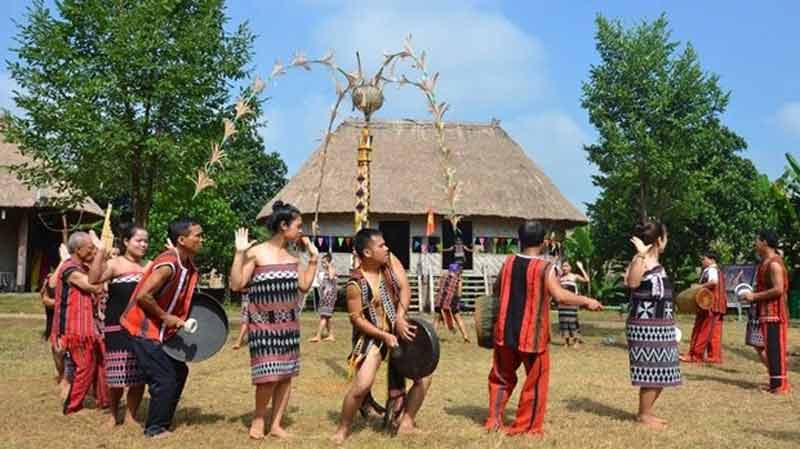
The Vietnam National Village for Ethnic Culture and Tourism is celebrating Vietnam Family Day 2020 (June 28) with a string of activities this June, as announced by the village’s management board on June 2.

A gong performance at the Vietnam National Village for Ethnic Culture and Tourism (Photo: tienphong.vn)
The activities focus on the theme of ‘A festival for Families’, including folk games, a handwriting contest, children’s painting, and a reading space for both children and visitors.
There are also performances of traditional musical instruments and folklore music, reproductions of the traditional rituals of ethnic groups, gong performances, and a xoang folk dance.
Visitors will have an opportunity to learn more about the craft of weaving and the tourism potential and indigenous culture of the Jarai people in the Central Highlands province of Gia Lai.
On June 28, the Raglai ethnic people in Ninh Thuan province will restage their traditional ritual to show filial piety. This ritual is not only observed within families but also among the entire community.
Photos on the cultural activities of the Raglai people, indigenous specialties, and tourist products of the province’s Bac Ai district will also be displayed at the occasion.
Source: NDO
With an increasingly vibrant and widespread emulation movement aimed at building cultured residential areas and cultured families, Yen Thuy District has been making steady progress toward improving both the material and spiritual well-being of its people, while fostering a civilized, prosperous, beautiful, and progressive community.
Once lacking recreational spaces and community facilities, Residential Group 2 in Quynh Lam Ward (Hoa Binh City) has recently received attention for the construction of a new, spacious, and fully equipped cultural house. The project followed the model of state support combined with public contributions in both labor and funding.
The "All people unite to build cultural life" movement, which has been effectively integrated with Kim Boi district’s socio-economic development goals, is fostering a lively spirit of emulation across local residential areas, hamlets, villages, public agencies, and enterprises. In addition, through the initiative, traditional cultural values are being preserved and promoted, while community solidarity and mutual support in poverty reduction and economic development are being strengthened.
A working delegation of the Hoa Binh provincial People’s Committee led by its Permanent Vice Chairman Nguyen Van Toan on June 11 inspected the progress of a project to build the Mo Muong Cultural Heritage Conservation Space linked to tourism services in Hop Phong commune, Cao Phong district.
Born and growing in the heroic land of Muong Dong, Dinh Thi Kieu Dung, a resident in Bo town of Kim Boi district, in her childhood was nurtured by the sweet lullabies of her grandmother and mother. These melodies deeply imprinted on her soul, becoming an inseparable part of her love for her ethnic group's culture. For over 20 years, this love for her hometown has driven Dung to research, collect, and pass down the cultural values of the Muong people to future generations.
In the final days of May, the Ethnic Art Troupe of Hoa Binh Province organized performances to serve the people in remote, mountainous, and particularly disadvantaged areas within the province. These were not just ordinary artistic shows, but they were the meaningful journeys aimed at spreading cultural values, enhancing the spiritual life of the people and contributing to the preservation of ethnic minority cultural identities.



